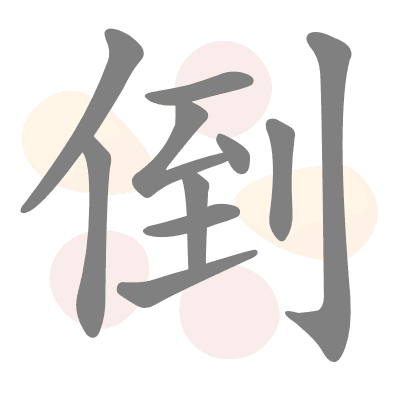倒
倒
v. to pour, to tip; to invert; to reverse; to move backward
| 80% | 120% |
Register to get less ads.
Registration is free and once you are registered you use this word in your private vocabulary lists.
Then you can train your own vocabulary either here or using one of our applications for PC, iOS or Android.
Registration is free and once you are registered you use this word in your private vocabulary lists.
Then you can train your own vocabulary either here or using one of our applications for PC, iOS or Android.
Other meanings
| v. to fall over, to fail or collapse; to overthrow; be spoiled, have malfunction; change, shift; move around; sell up; buy and resell at a profit |
|
| adj. upside down, inverted |
|
| adv. (contrary to common sense or one's expectation); but, however; (after a "verb + de" structure, implying blame); (in the subordinate clause, indicating concession); (in an imperative sentence or a question, indicating impatience); (used to soften the tone) |
|
 |
Simplified stroke orders are based on the 'Standard of National Commonly-used Mandarin Chinese Characters (现代汉语通用字笔顺规范)', issued by the China National Language and Character Working Committee (国家语言文字工作委员会) on April 7th 1997. Traditional stroke orders are based on information issued by the Taiwan Ministry of Education.
我 我 phr. I'm not feeling well, can you help me pour a cup of water, OK? |
他 他 phr. They poured themselves each a glass of beer. |
我 我 phr. I have not learned how to back the car up. |
倒 倒 v. to retrogress, to retrograde, go back, move back |
倒 倒 phr. take out the trash, empty the trash |




